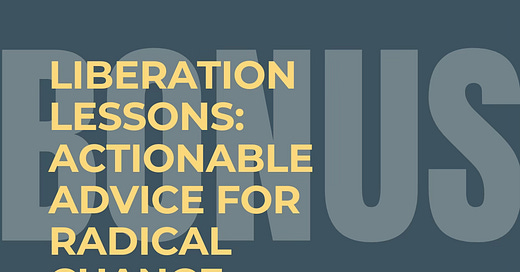How do I navigate guilt and shame when confronting my own privilege?
Liberation Lessons: Actionable Advice for Radical Change A Weekly Paid Subscriber Bonus
Dear Liberators,
Confronting privilege is an essential part of liberation work, but it’s not without emotional weight. Often, as we reflect on the ways we’ve benefited from systems of oppression, feelings of guilt and shame can arise. While these feelings are natural, they can also become obstacles if left unexamined—especially when we fail to consider the complexities of intersecting identities.
Intersectionality reminds us that we can simultaneously hold both oppressed and oppressor identities. For example, someone may experience oppression due to their race while benefiting from systems of patriarchy or heteronormativity. Liberation work requires us to peel back these layers, seeing ourselves fully in the context of these systems without becoming paralyzed by guilt or shame.
It’s important to recognize that shame is not an inherent emotion but a construct deeply rooted in systems like Christianity, designed to control and limit forward motion. Guilt and shame are not destinations—they are indicators that transformation is needed. The goal is not to stay stuck in these feelings but to move through them toward accountability, healing, and action.
In this Liberation Lesson, we’ll explore how to navigate the complexities of privilege, oppression, and intersecting identities using the LIBERATE framework to guide us toward meaningful growth and action.
This is just the beginning! Paid subscribers get access to the full article, exclusive insights, and actionable steps to deepen their liberation journey. Plus, as a subscriber, you’ll receive 10% off workshops and guides, including the Holiday Guide for navigating family dynamics with boundaries and care.




